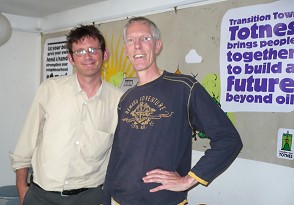Newsletter: 4. Sept. 2011
1. Tim's "summer holiday" in England

Rob Hopkins (left) and Tim Reeves
I spent 2 weeks in southern England, doing some visiting and spending plenty of time hiking and relaxing. I had three books on currency with me and did a lot of reading and thinking. I also had the very good fortune to be able to meet and talk with Rob Hopkins, the founder of Transition Town Initiative. Rob put me in contact with two economists active in alternative currencies – Mark Burton and Josh Ryan-Collins, both of whom I managed to meet and discuss issues with. The written and spoken input bore fruit…
2. Concept extensions
I had become increasingly concerned that two issues had previously not been adequately addressed:
- How to pay ReeComm staff and volunteers during the startup-phase,
when the ReeComm has no funds available. - How to ensure sufficient liquidity of Groks.
Remuneration in the startup-phase: Activity Points
Whereas many important tasks are nowadays conventionally performed by volunteers and idealists, the day to day running of a ReeComm with all its diverse tasks and responsibilities goes beyond that scope. On the other hand, the ReeComm will only have very limited means until it receives surplus from the companies in which it has invested, which may take 2 to 3 years.
To solve this dilemma we turned to claims on future profits of the ReeComm – conditional of course on there being such a profit which could be distributed. We then quickly noticed that such claims, when documented as points which someone collects, can be used in various interesting ways, not just as a claim on monetary profits. Read more about the activity point system.
Providing sufficient Grok liquidity
There are only two conceptual ways for Groks to come into circulation: either entitlements, material possessions or services must be given to the ReeComm in exchange for Groks (or a credit facility); or securities must be deposited for a credit facility – either way, you can't get more out than you put in.
These provisions, while ensuring the value and reputation of the Grok, do put clear and non-trivial requirements on each member of the market community. To avoid a liquidity problem – a lack of Groks to remunerate the goods and services which could and should be exchanged – a number of ways have been foreseen for a member to exchange something for Groks or to get a credit facility, so that each prospective member should be able to find a way which suits their personal situation.
In particular, the number of types of security which can be deposited for a Grok credit facility has jumped from one to three: To the previous deposition of joint-ownership certificates we have added the deposition of activity points and the forming of small groups of members who coresponsibly guarantee each others credit. Read more about the provisions for liquidity.
Extensions to the website
Beyond the descriptions of the new concepts noted above, the website has been extended with a complete new section on currency, and a suggested manifesto for ReeComms. Newsletter subscription has been simplified.
3. Answer from the UK's FSA on the legality of the Grok
The design of the ReeComm, and in particular of the Grok, conform to German national law, where the Grok is even exempt from supervision by the financial services authority. For other countries the relevant local authorities and fiscal experts must be consulted, and a set of rules for "your" Grok hammered out which are legal by your national laws.
We have received a reply from the UK's Financial Services Authority to our question about the Grok in the UK; it is both long and difficult to understand. We will be glad to provide it to anyone interested – just contact us.
4. Progress in the Munich Cooperative
The Cooperative "ReWiG München eG" was founded on 15. January with 45 members, 4 in the managing board and 4 in the supervisory board. Much of the work is performed in working groups, which make recommendations to the managing board on their assigned topics. In the meantime it has grown to about 65 members, and is currently working on all the legal and administrative tasks prerequisite to actually investing in local businesses. Another major topic of work is the market community, the work here being so much that it has been subdivided to 4 taskgroups.
The ReWiG München has already issued the first clutch of profit participation certificates with a ten-year term, this being their selected primary financing option. Shares in the Cooperative were rejected as a financing option since a member can opt out at relatively short notice, and must then be paid out, a fact which makes long-term investment unsure. Shares were used instead as a social "one head one vote" instrument and made very cheap.
Most of the concept extensions mentioned above have in fact been provoked by observation of where mechanisms were lacking in the ReWiG München. Another thing observed there is that it is easy to lose focus on interpersonal issues as the pressure of work and expectations build up – and that this aspect should therefore be actively pursued by a group or body which has it as their specific task.
![]()